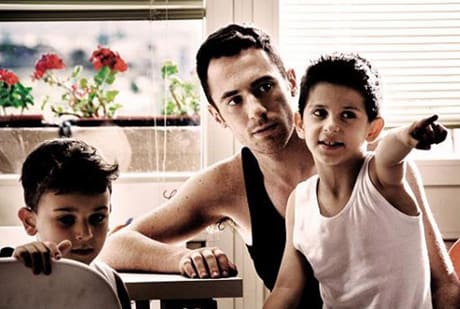Early on in Daniele Luchetti's Italian treatise on abject morality, a Romanian immigrant tells Claudio (Elio Germano), a recent widower and father of three, that Italians are obsessed with money and image projection. This comes just minutes after a dinner party wherein several young couples complain about the necessity of a dual income family just to get by.
What's clear is that, despite the Hallmark title (Our Life), this is a story about wanting more, not experiencing the now and performing roles for social expectations. Perhaps this is why so many character actions and reactions are so bizarre and disconcerting.
Following the death of his wife during childbirth, blue-collar construction worker Claudio leverages his knowledge of the accidental workplace death of an undocumented Romanian security guard to land a far more lucrative foreman gig, leaving his newborn with a local prostitute while he works and screws the wife of the dead guy. Aside from a single moment of rage, he expresses no discernable grief for his recently deceased wife, instead buying an endless array of gifts for his similarly nonplussed children.
Because the handheld aesthetic and Italian neorealist vibe of the film suggest something akin to the works of the Dardenne brothers, there's an assumption that this morally questionable behaviour has a didactic purpose. But Luchetti isn't working on multiple levels here, sticking to his "money can't buy you happiness" guns without providing much of a framework for character motivation, presuming audience identification with someone seemingly inhuman.
It makes for distanced viewing, and not in a Brechtian, Catherine Breillat kind of way, leaving only an obvious message to give the film its ire. Everything looks good on a technical level and Germano certainly brings his A-game to motivationally perplexing characters, constantly appearing on the edge of breakdown, but Our Life is essentially a result of tunnel vision and single-mindedness that never really work.
(Mongrel Media)What's clear is that, despite the Hallmark title (Our Life), this is a story about wanting more, not experiencing the now and performing roles for social expectations. Perhaps this is why so many character actions and reactions are so bizarre and disconcerting.
Following the death of his wife during childbirth, blue-collar construction worker Claudio leverages his knowledge of the accidental workplace death of an undocumented Romanian security guard to land a far more lucrative foreman gig, leaving his newborn with a local prostitute while he works and screws the wife of the dead guy. Aside from a single moment of rage, he expresses no discernable grief for his recently deceased wife, instead buying an endless array of gifts for his similarly nonplussed children.
Because the handheld aesthetic and Italian neorealist vibe of the film suggest something akin to the works of the Dardenne brothers, there's an assumption that this morally questionable behaviour has a didactic purpose. But Luchetti isn't working on multiple levels here, sticking to his "money can't buy you happiness" guns without providing much of a framework for character motivation, presuming audience identification with someone seemingly inhuman.
It makes for distanced viewing, and not in a Brechtian, Catherine Breillat kind of way, leaving only an obvious message to give the film its ire. Everything looks good on a technical level and Germano certainly brings his A-game to motivationally perplexing characters, constantly appearing on the edge of breakdown, but Our Life is essentially a result of tunnel vision and single-mindedness that never really work.
